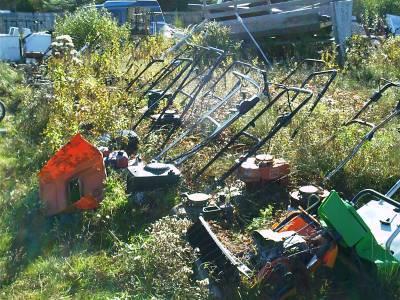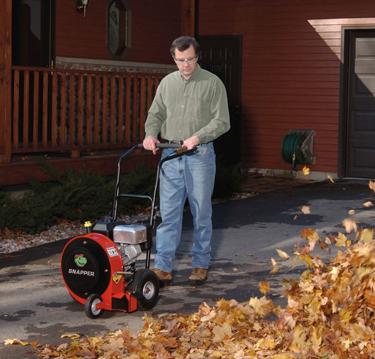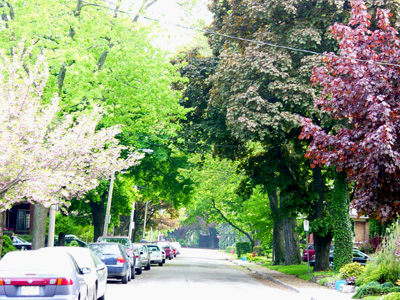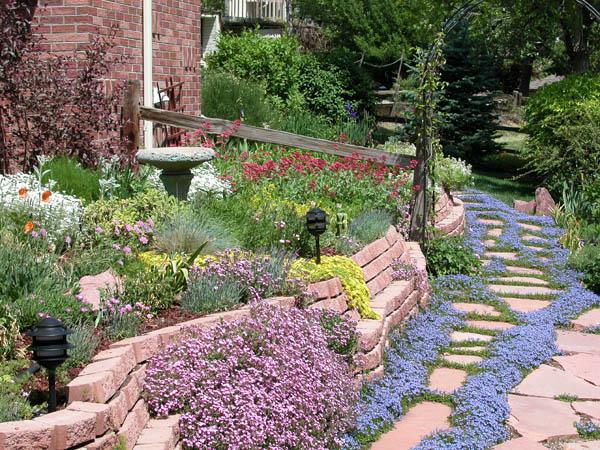The positive effects of our lawns and gardens can quickly be negated if we are not careful about the tools we use to maintain them.
By Sean Burak
Published April 30, 2007

A lawnmower graveyard - in a more perfect world, lawnmower disposal would be a more lucrative business than lawnmower manufacturing. (Image Credit: Flickr)
The sun is shining, the birds are singing, the smell of blooming flowers is in the air, and your neighbour starts up his mower, filling the block with the sounds and odours of belching two-stroke engine.
Yes indeed, the arrival of spring has been obnoxiously announced. North Americans are addicted to their lawns. We collectively spend vast amounts of time, energy and money trying to force non-native grass species to grow where nature did not intend.
We adhere to the despicable concept of putting our drinking water on the lawn, along with chemical fertilizers so that it grows faster, and then mowing it down a week later with one of the least efficient gas powered devices available to hummankind.
We remove the clippings in the summer and the fallen leaves in the autumn, choosing to send this natural plant food to the landfill instead of letting it feed next year's crop. The time has come to bring down the gas-powered lawn care habits that have spread across the entire continent.
Summer is on its way, and with the number of smog days on the rise, we could all benefit from an improvement in air quality. While vehicular emissions and industrial pollution are constantly in the climate change spotlight, we can't just stop driving and shut down the factories overnight. However, cutting back on lawnmower use is something that we can all do right now, and it can make an enormous difference.
A 2001 Swedish Study found that running a gas-powered lawnmower for one hour is the emisions-equivalent of driving 160 kilometres in a car - and older lawnmowers are even worse, producing the same pollution in an hour as a 1992-era automobile emits over a 1000 kilometre ride!
According to the California Resource Board, "Gallon for gallon ... the 2006 lawn mower engines contribute 93 times more smog-forming emissions than 2006 cars".

Stop the Insanity! Pictured is a 6 horsepower Snapper brand leafblower which retails for over $500 and weighs over 100 pounds (Image Credit: Snapper)
Come fall, I constantly see individuals and lawncare companies blowing leaves from one place to another. To these people I say: If you are so obsessed with moving leaves around, buy a rake and use your muscles. Gas-powered leaf-blowers are even worse than lawnmowers: an hour of use emits the same amount of pollution as an automobile traveling 560 kilometres.
Whereas cars spread their tailpipe gases over a great distance, the polluting effect of landscaping machines is worsened still since they concentrate the emissions in very small areas which tend to have a concentrated population.
Last year, a neighbour asked me to cut down a mature tree in my yard (a tree which is probably older than our houses) because it was too difficult for her to clean the leaves up.
This is nonsense. To begin with, the leaves that fall from the tree will naturally turn to plant food for the next growing season. They should be left alone (or at least collected and composted for future use).
Second, trees provide many additional benefits - reduction of summer cooling costs, reduction of outside air temperatures under the tree by several degrees and tempering the heat island effect in cities to name a few. As such we should be trying to plant more trees never mind removing the ones we already have.

Trees clean the air. Trees improve water quality. Trees save energy. Trees raise real estate value. Trees are good for business. Trees help stop inner city violence. The list goes on. (RTH File Photo)
Finally, the city has a policy regarding removal of trees:
Trees are only removed when they become a liability to the New City and its residents. Requests for tree removal due to seed production, leaves dropping and clogging eves troughs or the inability of the homeowner to continue raking leaves cannot be accepted as valid reasons for removal. The subsequent homeowner may appreciate a shade or ornamental tree on their property.
Be sure to keep this in mind if you are ever faced with a similar request.
Grass clippings should be seen the same as fallen leaves -- as plant food. Up to 10% of municipal waste collection consists of grass clippings, meanwhile, disposal of clippings is completely unnecessary since they break down very quickly (within days or at most, weeks).
A Northeastern Illinois program provides a good model for a used lawnmower buyback program. Let your councillor know that you'd like to see Hamilton implement something similar as soon as possible. In the meantime, the Clean Air Foundation is supporting a lawnmower rebate program at Home Depot stores across Canada.
This is a great opportunity to get credit towards the purchase of an emissions-free push mower. Today's push mowers are lighter and easier to use than the ones our grandparents had -- and denser neighbourhoods (which tend to have smaller lawns to mow) would benefit most from eliminating power mowers completely.
If you want to keep your grass, be sure to use the most efficient lawnmower that you can find. If you want to do even more, you can eliminate the need to mow altogether. By replacing your grass with low maintenance native alternatives, you'll relegate the lawnmower to nothing more than a distant memory.

This Xeriscape in Colorado shows the beauty of a grass-free yard. No mower required! (Image Credit: Xeriscape)
The best part of the solutions to this lawn care epidemic is that most of them are cheaper and easier to implement than their current (human-unfriendly) counterparts.
If you can look past the fact that you won't have a golf-green-perfect lawn, you can save heaps of money (and time) by following a few simple rules and letting nature take its course. This is one of the rare cases where doing nothing can actually help:
Ample thriving greenspace is important within the city, especially in more population-dense areas. Not only does it create a more pleasant space for living, it also counteracts the negative effects of our addiction to asphalt and automobiles (both of which contribute to poor air quality and localized temperature increases).
However, the positive effects of our lawns and gardens can quickly be negated if we are not careful about the tools we use to maintain them. So put away the gas can, grab a rake, and enjoy your yard the way it was meant to be: free of both noise and air pollution.
By Ted Mitchell (registered) | Posted May 09, 2007 at 21:22:27
Sean is being too nice with this article. I would like to see a study on how many Hamiltonians are bothered by the lawn maintenance noise and pollution that is de rigueur for "civilized" urbanites these days. Wild guess, 25% find this extremely annoying. Truthfully more, but since they have the weapons hanging in the garage they'll never admit it.
On the survey, put me down for "this is the single most irritating thing I experience at my home", and "I'm in disbelief that seemingly nice, educated people can do this to their neighbours"
The vanity virus has spread quickly from the suburbs.
It is not that it is so much louder than the city trimming trees or clearing snow. It's that it is so selfish and unnecessary. Once after a night shift, a neighbour's lawn service leaf blower with no working muffler woke me up, above the fan noise I use to mask such things. I quietly confronted her with how unbelievably annoying it was (the conversation was difficult due to the noise). "I don't know what I can do" was the reply. Ahhh... forget it. We don't talk. It is hard to consider such people human.
How many years will it take before people start to consider that baby steps such as banning these things on smog days might be worth considering and hopefully we will not offend those sweet lawn companies who provide so much employment and put food on Tiny Tim's plate... (shhhh don't tell them that more jobs could be created if workers used quiet manual tools)
I doubt that guilt or shame will work, obviously the guilty are deficient in these qualities. But vanity might, as in if several people on a posh street hire noiseless lawn services, then it becomes trendy to show off that you can afford the greener way. I hold out some hope for that.
By seancb (registered) - website | Posted May 10, 2007 at 12:49:14
Another air quality advisory day today... I can't wait to count the freshly mowed lawns I pass on my way home from work.
I also forgot to discuss the dangers of using this equipment, particularly with kids nearby: http://health.ivillage.com/everdayprobs/...
The prominence of these ridiculous lawn care practices is probably my biggest pet peeve.
By Love Your Neighbor(0: (anonymous) | Posted June 16, 2009 at 14:31:52
I totally hear you on this, especially when you've got a napping munchkin afraid of loud noises *cringe*, but the biggest thing I got out of this article was a hope for a compassionate humanity. As in, I hope while you were upset about your neighbor expressing difficulty keeping up with the leaves, you were at least a responsible neighbor who also offered to rake them for her. Either that or she could always hire some company to come and mulch them. Hm...I agree with the article, but I do hope you had compassion for what your neighbor felt was important, and depending on her age and physical condition, impeding her health. Love your trees, but love your neighbors too(0:
You must be logged in to comment.
There are no upcoming events right now.
Why not post one?